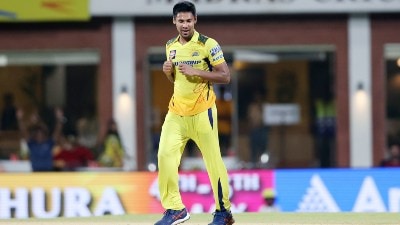Warne wins India over
If Warne was Napolean, India was his Waterloo. From his Test debut he always got bashed by India.

When Shane Warne announced his retirement from world cricket in December of 2006, the Indian team was playing a series in South Africa. At Durban, five days before the Boxing Day Test, the media was hungry for bytes from two members of the side 8212; Sachin Tendulkar, Warne8217;s great adversary, and Anil Kumble, India8217;s own humble answer to the leg-spinner.
The tributes flowed. Kumble said Warne had almost made leg-spin his own personal legacy, and Tendulkar described at length how it was always important to keep your eyes wide open while playing him.
But, despite all the praise, there was a sense back home that they were being too kind. For all his wickets 8212;- 1,001 in all in Tests and one-dayers 8212; and his 8216;ball of the century8217; to Mike Gatting in the Ashes of 1993, Warne had never captured India8217;s imagination.
A cricketer8217;s worth in a country is often measured by how well he has done against them and, if Warne was Napolean, India was his Waterloo. Right from his Test debut 8212; when he went for 150 runs for just one wicket in Sydney, to when he had nightmares about Tendulkar in 1998, till VVS Laxman and Rahul Dravid took him apart in Kolkata to script India8217;s revival in 2001 8212; he was always on the receiving end.
If there was anything Warne regretted at the end of his career, it would perhaps be his Test bowling average of 47.18 against a country that is the spiritual home of spin.
Serial womanizer
Warne was always regarded as a genius with flaws, most of them to do with what the British tabloids described as his 8220;serial womanising8221;. There was a time when he was more in the news for being a 8220;sms pest8221; than he was for his wickets. He had a very public separation with his wife Simone Callahan, and then allegedly ended up sending her a suggestive message intended for someone else.
Other embarrassing sidelights of his eventful career were being fined for soliciting an Indian bookie, and getting banned from the 2003 World Cup because he consumed a banned substance which he claimed his mother had given him to help him lose weight.
All these incidents cost him a chance to ever captain the Australian team. Now, after the Rajasthan Royals8217;s win, he is being hailed as the 8216;best captain Australia never had8217;. And, considering the almost insurmountable peak he has climbed over the last 45 days, a lot of people would perhaps buy into that theory.
Warne8217;s style of captaincy during these last six weeks will go down as stuff of legend. Dealing with players who were either in awe of him, or with whom it wasn8217;t easy for him to communicate, or both, he managed to create a sense of mutual trust in the dressing room.
8220;Everybody is equal in the team. If Shane Watson and Swapnil Asnodkar are late, they are given the same penalty,8221; Warne explained midway through the journey. 8220;One of our team slogans is 8216;find the way8217; and also 8216;play your role8217;,8221; he said at another time.
Breaking barriers
But, for an outsider, the hallmark of the campaign was the way Warne and his boys praised each other after every victory. While Swapnil Asnodkar and Yusuf Pathan spared no opportunity to shower credit on the leg-spinner for inspiring them, Warne has repeatedly given out headline-quotes about his young team mates.
8220;I will be 40 next year, a bit too old for these sort of finishes. But the players, they make me feel young,8221; he said after the nail-biting final, while crowds in the stands and in front of TV screens across India were indulgently shaking their heads in disbelief.
The success of the IPL would always depend on how team mates from different nationalities and cultures would combine as a unit, playing quality cricket and convincing fans that they really felt motivated to play for their adopted cities. Of all the captains in the tournament, it was Warne who truly broke the barriers.
From Mohammad Kaif to Graeme Smith to Sohail Tanvir, they all felt they belonged to Jaipur8217;s royal blue. In a tournament that was never expected to be any more than pulp fiction, Warne8217;s Rajasthan ended up scripting a classic.
So, 16 years after he started his international career and one-and-a-half after he finished it, Warne finally rules over the hearts and minds of Indian cricket fans. By succeeding with a team which was dismissed before the start of the IPL as a 8216;rag-tag8217; bunch, he has shown India what the rest of the world knew for a long time, and then a little more.
- 01
- 02
- 03
- 04
- 05































